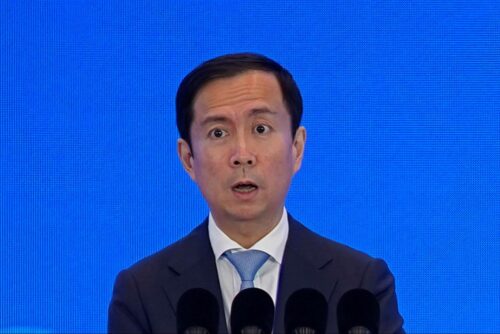Job not open to Beijing natives? Alibaba’s online supermarket apologizes for discrimination

Type in, “Why are people from [Chinese province name]…” on Baidu, and wait for the search engine to autocomplete different regional stereotypes: Xinjiang people are “chaotic,” Shanghai people are “unfit to lead,” Henan people are “thieves,” etc. China has a long history of regional discrimination, especially in urban areas like Beijing and Shanghai, where outsiders are often considered lower-class citizens. Just look at what happened late last year, when the Beijing government expelled large numbers of migrant workers from its suburbs, leaving the city “a devastated war zone.”
But Beijingers recently had the tables turned on them when a job seeker accused Hema (盒马鲜生) — an online supermarket subsidiary of Alibaba Group — of regional discrimination. On July 5, a job applicant posted to Weibo a series of screen captures that show a Beijing-based recruiter asking her if she was a local. After she confirmed she was a Beijinger, the job recruiter replied, “We do not hire locals, sorry.”
The exchange:
Recruiter: “Beijingers have money.”
“We can’t afford you.”
“Sorry.”
Applicant: “If Beijingers have money, why do we still need to work?”
“Maybe the ones you’ve been in touch with have money, but I have no money. I have to work. Is there a problem with that?”
Recruiter: “Company policy, sorry.”
Applicant: “It doesn’t say you don’t want Beijingers.”
“Also, if you don’t want Beijingers, why did you open stores in Beijing?”
Recruiter: “I’m also an employee, I do what my boss tells me to.”
Applicant: “Your boss might be mental. If this is what you are saying, the boss is an idiot. If you agree [with the boss], then there’s no need to talk further. I personally think you have problems, too.”
Recruiter: “Yes.”
“We don’t want any of you Beijingers.”
“Whatever you say, we don’t want you.”
Applicant: “Aren’t you picking a quarrel?”
“The job [description] doesn’t say you don’t want Beijingers. Now, I’m looking for a job, and you’re telling me that Beijingers are not wanted.”
In a statement issued by the Alibaba subsidiary on July 5, Hema suggested that the recruiter was not an employee of Hema, but a part-time staff of Liwei, a third-party labor outsourcing company. “One’s hometown has never been a condition for Hema’s recruitment. In fact, 22 percent of Hema’s Beijing-based employees are Beijing natives,” the statement said. “Liwei’s recruiter severely violated Hema’s principles.”
The next day, on July 6, the company officially issued an apology, reasserting that where one is from has never mattered. Hema has suspended all cooperations with Liwei and started a comprehensive investigation of its partners, according to the statement. “Today, we contacted the person involved, and we sincerely hope that she will accept our apology.”
The incident sparked outrage on the Chinese internet. “So Hema only wants our money, not us. I won’t use Hema’s service ever again,” one Weibo user from Beijing wrote, claiming that Beijingers should boycott the company. Some locals — nativists, really — also suggested that Beijingers should raise the rent to retaliate against migrant workers who have taken jobs away from locals.
But many others consider the incident a lesson for haughty Beijingers who have long held a sense of superiority over outsiders. “To be fair, it’s good that Beijingers can finally get a sense of how non-locals have been treated,” one Weibo user wrote, condemning those who fail to acknowledge their privilege.
China’s hukou (“household registration”) system — under which one’s “hometown” is not determined by birthplace or residential address, but where the household is registered — only exacerbates regional discrimination. It is extremely difficult for migrants from other Chinese provinces to obtain a Beijing hukou, which grants them permanent residency, social security, and the privilege to purchase property in the city.
Children of non-locals — even if were born and raised in Beijing — are often ineligible to attend public high schools in the city, nor can they sit for the college entrance exam (they have to return to the province in which they are registered). To get admitted to the same university, a high school student with a Shandong hukou needs to attain much higher score than a Beijing peer.
Recently, the Beijing government introduced a new policy on the private taxi sector, barring those without a Beijing hukou from becoming drivers on online ride-hailing platforms such as Didi. Prior to the ban, approximately 90 percent of the 200,000 active Didi drivers in Beijing were migrant workers, according to Sohu.
Long wait on Didi? Blame Beijing’s July 1 crackdown on private taxi drivers
In April 2015, Beijing’s Human Resources and Social Security Bureau proposed a plan to control population growth and the local unemployment rate by encouraging employers to “hire more workers with a Beijing hukou,” sparking online debate.
In May, the video streaming service iQiyi was accused of discriminating against job applicants from Henan Province. Last year, a recruitment staffer who worked for Meituan, an online catering service, suggested that the platform wouldn’t consider applicants from Henan and northeastern China (the provinces of Heilongjiang, Jilin, and Liaoning). Both platforms fired the recruiters after the incidents stirred public outcry.






